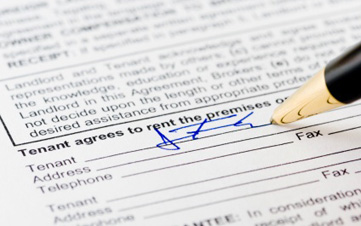8 Reasons You Fight With Your Roommates About Money
Whether you’re moving out of the dorms for the first time or you’ve been living sans-resident-adviser for a while now, you might consider getting one or more roommates to help cut costs.


Profit and prosper with the best of Kiplinger's advice on investing, taxes, retirement, personal finance and much more. Delivered daily. Enter your email in the box and click Sign Me Up.
You are now subscribed
Your newsletter sign-up was successful
Want to add more newsletters?

Delivered daily
Kiplinger Today
Profit and prosper with the best of Kiplinger's advice on investing, taxes, retirement, personal finance and much more delivered daily. Smart money moves start here.

Sent five days a week
Kiplinger A Step Ahead
Get practical help to make better financial decisions in your everyday life, from spending to savings on top deals.

Delivered daily
Kiplinger Closing Bell
Get today's biggest financial and investing headlines delivered to your inbox every day the U.S. stock market is open.

Sent twice a week
Kiplinger Adviser Intel
Financial pros across the country share best practices and fresh tactics to preserve and grow your wealth.

Delivered weekly
Kiplinger Tax Tips
Trim your federal and state tax bills with practical tax-planning and tax-cutting strategies.

Sent twice a week
Kiplinger Retirement Tips
Your twice-a-week guide to planning and enjoying a financially secure and richly rewarding retirement

Sent bimonthly.
Kiplinger Adviser Angle
Insights for advisers, wealth managers and other financial professionals.

Sent twice a week
Kiplinger Investing Weekly
Your twice-a-week roundup of promising stocks, funds, companies and industries you should consider, ones you should avoid, and why.

Sent weekly for six weeks
Kiplinger Invest for Retirement
Your step-by-step six-part series on how to invest for retirement, from devising a successful strategy to exactly which investments to choose.
Whether you’re moving out of the dorms for the first time or you’ve been living sans-resident-adviser for a while now, you might consider getting one or more roommates to help cut costs. But sharing a living space can be a minefield of monetary problems.
Sidestep any big blowups by discussing how you’ll address potential problems with your roommate(s) before you even sign a lease. And consider formalizing your chat by creating an official roommate agreement -- signed and notarized, just in case a little spat escalates to a legal battle. Here are eight common causes of cohabitation conflict that you might address in your contract:

Size Matters
Specify how much each person will pay for rent and which room (or side of the room) each person will get. Especially if one room is bigger or comes with better perks (such as a nice view or its own bathroom), everyone needs to agree on the living situation. You may all decide that the person taking the biggest room ought to pay the biggest slice of rent.
Or you can work out another arrangement. For example, my old roommate and I shared a two-bedroom apartment, where I got the master bedroom and she took the other, much-smaller room. We didn’t want to quibble over how much each room was worth, so we agreed to split the rent evenly. To make it fair, I let her use the majority of the common area as her personal office space. And we lived together happily ever after -- for a year.

Payment Punctuality
On top of the rent, discuss the other expenses you’ll share and how you’ll manage them, including who will be responsible for which payments and when everything will be due. If any accounts in your name go unpaid because of your roommates’ irresponsible behavior, you’ll be the one legally bound to the problem and dealing with a dinged credit score if a delinquent bill goes to a collections agency.
Many group-house residents hail the old-school whiteboard as the perfect bill-tracking tool. Keep it in a common area, and clearly note who owes what and when each bill is due. If you or your roomie plans to be away when bills come due, make sure payments are made before you take off. Each person can check off his or her payments as they are submitted. And everyone will be able to see who hasn’t paid what. Or if you’d rather take a digital approach, you can try a money-management site such as WePay.com, ioweyou.co.uk or Buxfer.com.

Commitment Issues
Be sure to address the length of your shared lease and the repercussions for anyone who wants to cut out early. If you break your lease, you’ll likely pay a hefty penalty and lose your security deposit. Or if you decide to stay, you’ll find your monthly costs double until you find a replacement roommate. Either way, the person heading out should bear the brunt of those costs.

Keeping It Clean
Talk about your housekeeping habits and how you’ll deal with cleaning up common areas. Will you share the cost of cleaning supplies? How will you divide household chores? What consequences will a sloppy slacker suffer?
One San Diego resident, for example, employed a neat neatness incentive with his old roommate: “We wanted to keep the living room as clean as possible, so the rule was that at the end of the day, everything had to be clear,” he says. “If the next morning you had something lying out, you had to donate one dollar to the charity of the other person’s choice. It worked great.”

Damaged Goods
Go over how you’ll handle any major damages and consider getting rental insurance. This coverage can ensure you’ll be reimbursed if your personal property is stolen or damaged, or if someone is injured on the premises. You and your roommates can all share a single policy, but each of you may be better off getting your own, just in case you need protection from each other or you don’t wind up bunking together as long as you expected.
Policies tend to cost about $200 to $300 a year, depending on your location and level of coverage. You can compare plans at InsWeb.com. If you have an auto insurer, check that company’s rates for a renter’s insurance policy, too; you may score a discount for buying multiple policies from one company.

Pet Peeves
You and your roomies should also discuss the added mess of pets. If you decide to allow them, detail where they’ll be allowed and who will be responsible for them and any related damages. In my old digs, for example, my bedroom was a no-dogs-allowed zone, but my roommate’s and her frequently-visiting boyfriend’s pups were free to stay in her room and roam the common areas. She took full responsibility for the canines, including paying the extra monthly costs of keeping a pet in our place and cleaning up after them. (But I was happy to take them out when asked nicely and to enjoy plenty of slobbering puppy kisses and loving pit bull protection.)

Food Fights
Decide what food costs, if any, you’re going to share and how you’re going to split the bill. A friend of mine recently moved into a group house where each resident contributes $150 monthly to a shared grocery fund. The cash is kept in a jar, and withdrawals are (not) monitored by an honor system. But the group is now considering opening a joint checking account, which would allow house members to better track where the funds are going.
Of course, you might opt to keep your groceries separate. Just be sure to add Sharpies and Post-it Notes to your shopping list. After living in a group house where everyone was responsible for their own groceries, a former food-labeler says, “It always lead to problems where people would eat other people’s food, and then we’d leave passive-aggressive notes for each other.” The group tried to clarify ownership by writing their names on their food containers and having open discussions about the problem. But edible thievery continued. The sneaky snacker is still at large, but the victims have moved on to lives with more respectful roommates and without Post-it-covered foodstuffs.

Hot Tempers
The cost of utilities can burn anyone up. In fact, our previously mentioned San Diego resident once had a roommate who used utilities to give him a wicked burn: “I had the utilities in my name, so when things got bad [between us], the dude blasted the heat with the windows open as long as possible,” he says. “He’s probably a hero for San Diego Gas & Electric right now.”
Crazy behavior aside, you might avoid paying for extreme temperatures on either end of the thermometer if you specify a moderate range of seasonal temperatures you’d like to stay within. And consider splitting the bill for utilities, so you all have an incentive to keep the costs down.

More From Kiplinger
SLIDE SHOW: 10 Great Cities for New Grads
ASK KIM: 7 Personal Finance Basics for New Grads
KIP TIP: 10 Great Gifts for College Grads
SLIDE SHOW: How to Save $50 a Day on Food and Meds
Profit and prosper with the best of Kiplinger's advice on investing, taxes, retirement, personal finance and much more. Delivered daily. Enter your email in the box and click Sign Me Up.

Rapacon joined Kiplinger in October 2007 as a reporter with Kiplinger's Personal Finance magazine and became an online editor for Kiplinger.com in June 2010. She previously served as editor of the "Starting Out" column, focusing on personal finance advice for people in their twenties and thirties.
Before joining Kiplinger, Rapacon worked as a senior research associate at b2b publishing house Judy Diamond Associates. She holds a B.A. degree in English from the George Washington University.
-
 When Estate Plans Don't Include Tax Plans, All Bets Are Off
When Estate Plans Don't Include Tax Plans, All Bets Are OffEstate plans aren't as effective as they can be if tax plans are considered separately. Here's what you stand to gain when the two strategies are aligned.
-
 Relying on Real Estate in Retirement? Avoid These 3 Mistakes
Relying on Real Estate in Retirement? Avoid These 3 MistakesThe keys to successful real estate planning for retirees: Stop thinking of property income as a reliable paycheck, start planning for tax consequences and structure your assets early to maintain flexibility.
-
 These Small Money Habits Really Can Plant Roots
These Small Money Habits Really Can Plant RootsFebruary gets a bad rap for being the month when resolutions fade — in fact, it's the perfect time to reset and focus on small changes that actually pay off.
-
 What to Do With Your Tax Refund: 6 Ways to Bring Growth
What to Do With Your Tax Refund: 6 Ways to Bring GrowthUse your 2024 tax refund to boost short-term or long-term financial goals by putting it in one of these six places.
-
 What Does Medicare Not Cover? Eight Things You Should Know
What Does Medicare Not Cover? Eight Things You Should KnowMedicare Part A and Part B leave gaps in your healthcare coverage. But Medicare Advantage has problems, too.
-
 12 Great Places to Retire in the Midwest
12 Great Places to Retire in the MidwestPlaces to live Here are our retirement picks in the 12 midwestern states.
-
 15 Cheapest Small Towns to Live In
15 Cheapest Small Towns to Live InThe cheapest small towns might not be for everyone, but their charms can make them the best places to live for plenty of folks.
-
 Best Cold Weather Places to Retire
Best Cold Weather Places to RetirePlaces to live Some like it hot; others, not so much. Here are the 12 best places to retire if you can't stand the heat.
-
 15 Reasons You'll Regret an RV in Retirement
15 Reasons You'll Regret an RV in RetirementMaking Your Money Last Here's why you might regret an RV in retirement. RV-savvy retirees talk about the downsides of spending retirement in a motorhome, travel trailer, fifth wheel, or other recreational vehicle.
-
 The 24 Cheapest Places To Retire in the US
The 24 Cheapest Places To Retire in the USWhen you're trying to balance a fixed income with an enjoyable retirement, the cost of living is a crucial factor to consider. Is your city the best?
-
 The Six Best Places to Retire in New England
The Six Best Places to Retire in New Englandplaces to live Thinking about a move to New England for retirement? Here are the best places to land for quality of life, affordability and other criteria.
